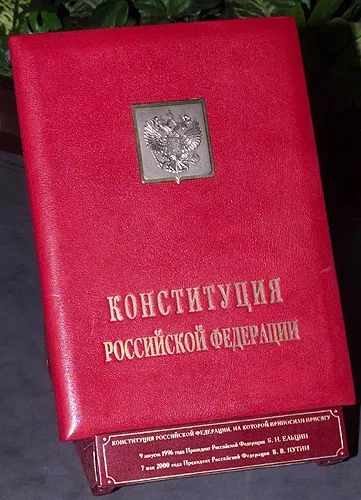Does the Russian Constitution Enable Corruption?
 If any of you out there have been following the news at all, you have seen the unfolding of the courts decision to allow the morons to the left (which belong to an anti-America, anti-gay, anti-…well, just about everything) to protest at a funeral of a fallen soldier waving signs just like you see here.
If any of you out there have been following the news at all, you have seen the unfolding of the courts decision to allow the morons to the left (which belong to an anti-America, anti-gay, anti-…well, just about everything) to protest at a funeral of a fallen soldier waving signs just like you see here.
Anyone who has spent any time studying domestic Russian politics since the collapse of the Soviet Union knows the Russian Federation has had a serious problem with corruption, especially within its police forces. Although I think there is a tendency to blame Prime Minister Putin by Russophobes in the international community, including here in the United States, the truth is that he and President Medvedev has spent the past few years fighting that corruption rather than sponsoring it.
Going through the Государственная дума (the State Duma, which is the lower house of the Федеральное Собрание [Federal Assembly of Russia] - Russia's legislature) is a bill that will seriously crack down on police corruption. In particular, police officers who fail to follow (legitimate) orders or are involved in corruption will face time in prison. And Russian prisons aren't like American prisons. Upon first reading, the entire United Russia and Liberal Democrat parties jumped on board, which was enough to get it passed. The Communist Party objected, but they're communists.
But here's an interesting argument. We've been talking a lot about the US Constitution since Barack Obama became President in this country... so what about the Russian Constitution?
Статья 19.2
Государство гарантирует равенство прав и свобод человека и гражданина независимо от пола, расы, национальности, языка, происхождения, имущественного и должностного положения, места жительства, отношения к религии, убеждений, принадлежности к общественным объединениям, а также других обстоятельств. Запрещаются любые формы ограничения прав граждан по признакам социальной, расовой, национальной, языковой или религиозной принадлежности.Article 19.2
The State shall guarantee the equality of rights and freedoms of man and citizen, regardless of sex, race, nationality, language, origin, property and official status, place of residence, religion, convictions, membership of public associations, and also of other circumstances. All forms of limitations of human rights on social, racial, national, linguistic or religious grounds shall be banned.
From an outsider's perspective, parts of this seem really stupid. For instance, guaranteeing the equality of rights and freedoms, regardless of convictions? In other words, convicts could theoretically serve as police officers (and we wonder why there's a problem?).
Beyond that, offering the equality of rights, regardless of official position, was also a poor decision. Let's set up a scenario: You have a friend who, for one reason or another, needs $1,000 and you give him that money. In America and Russia, you can give this individual $1,000. There might be a gift tax in the US, but that's about the extent of government involvement.
Now, let's say your friend is a police officer. It's 3:10 AM right now, so I'm not going to call any of my police friends... but I'm pretty sure that if I gave one of them $1,000; we'd have a lot of paperwork to fill out in order to get it approved. Why? Well, because giving a police officer $1,000 could easily be seen as a bribe. But in Russia, the Constitution offers the same rights and freedoms a civilian has to the police officer.
So, what the heck were they thinking!?
While I do think these are problems with the Russian Constitution, the reason these particular problems exist is actually quite rational and easy to understand if you take them at face value and consider the context under which they were made.
On the matter of convictions, there were a lot of people who were political prisoners and wrongly convicted under the Soviet Union. When the new government was taking over, it would make sense that these convicts under the previous regime would have their rights restored to them. Additionally, it operates on the very idealistic (which is what the framers of this Constitution were) principle that once you do your time in prison, you come out a reformed citizen.
Again, I state, Russian prisons are far worse than their American counterparts. If you come out reformed, it's because you went in a decent person and came out a monster.
And on the matter of official positions, this too makes sense. The problem is that we're looking at it backwards. When written, the equal rights and freedoms, regardless of official position, meant that the Russian citizens would enjoy the same rights and freedoms enjoyed by government officials, who had significantly more freedom in the Soviet Union.
In a perverted sort of way, the Soviet Union has left its mark on Russia by inserting its influence into the Constitution. When the American framers came together for the Philadelphia Convention to replace the Articles of Confederation, we had already been a free people for quite a while and the ideals of those freedoms had gone back as far as two or three generations in many cases. So when the American framers pieced together the US Constitution, they wrote it as free people limiting their government.
However, because the oppression in the Soviet Union was so absolute for so long, the ideals of freedom hadn't had time to sink in by the time their Constitution was being written. Even in the two years between the fall of the Soviet Union (December 25, 1991) and the adoption of this Constitution (December 12, 1993), the people spent more time trying to cope with the enormous economic changes and food shortages than pondering the meaning of their political freedom. As a result, the focus of the Russian framers was on liberating the people rather than limiting their government.
But when you liberate people by giving them the same rights as the government, you're liberating the government by giving government officials the same rights as the people. That makes corruption a LOT more difficult to combat.
I understand that foreigners tend to have a lot of mistrust towards President Medvedev and Prime Minister Putin right now. However, the people of Russia may find it necessary to have a Constitutional Convention in the Russian Federation sometime in the future to remedy these problems and others in the Russian Constitution. Otherwise, as Russian critics are pointing out about this proposed legislation, laws that "discriminate" against police officers and politicians (corrupt or not) might be forbidden by courts that, like some on the police force, are prone to corruption enabled by the Russian Constitution.
If you ever get bored:
http://www.constitution.ru/









